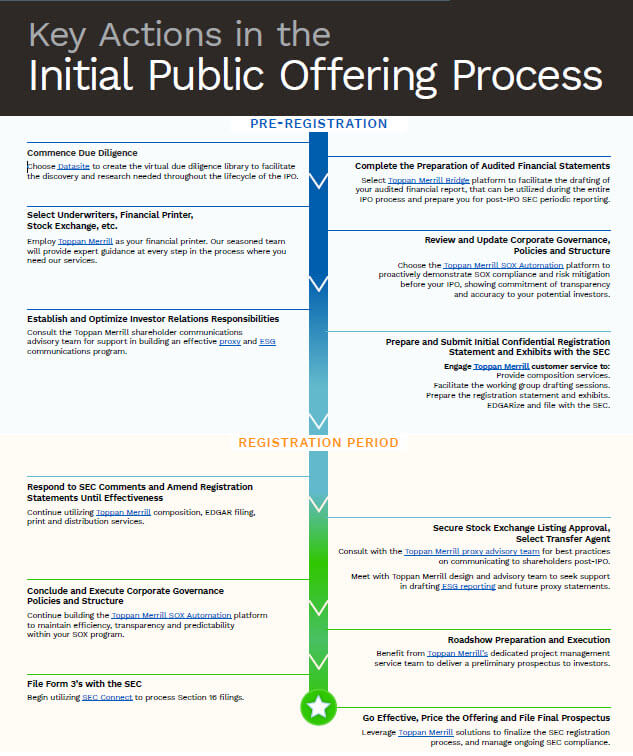Introducing Quinn for IPO Prospectuses
Powerful and flexible, Quinn radically simplifies the process of creating complex IPO prospectuses by eliminating arduous, low-value formatting tasks, endless review cycle management, and painstaking comment reconciliation, so you can focus on the content.
Seize the opportunity – let us help you navigate the IPO regulatory disclosure process.
When you’re trying to complete an IPO on world capital markets, you either move at the speed of the markets or get left behind. It’s not just every second that counts – it’s every clause, every footnote, every decimal point and every deadline.
Empower your team to deliver more, more easily than ever before with support from a dedicated team of specialists, on-call 24/7.
You need a partner that has extensive IPO filing and industry expertise with demonstrated capital markets life cycle management experience. That partner is Toppan Merrill.
Tested and trusted by:

Offerings
Project Management
Benefit from dedicated project management service teams who provide around-the-clock coverage to create, maintain and expedite your time sensitive work.
Composition
The IPO process is exacting. Enjoy peace of mind knowing that your dedicated service team has decades of experience and multiple quality checks in place to ensure your prospectus is perfect.
EDGARization
With a well-seasoned team, you benefit from quick and accurate conversion of documents into acceptable SEC EDGAR format.
XBRL/iXBRL
Dedicated XBRL/iXBRL subject matter experts know exactly what it takes to stay ahead of regulatory disclosure requirements and keep you in compliance.
SEC Filing
With leading technology solutions and software backed by world-class service and subject-matter expertise, we execute complex IPO filings while navigating a world of ever-changing regulations.
SEDAR +
As an original adopter and tester of SEDAR, Toppan Merrill also specializes in Canadian Securities Administrators (CSA) submission standards and stays apprised of regulatory changes to ensure error-free filing.
Global Translations
Deliver, no matter the language, with Toppan Merrill translation capabilities in 14 languages.
Conference Facilities
Enjoy everything you need to work collaboratively, effectively and securely to get the deal done — global offices with state-of-the-art conference facilities and all the necessary amenities for your working group.
Printing and Distribution
End-to-end document creation including in-house printing and distribution, means you mitigate risk and ensure on-time delivery.

Why Toppan Merrill
Our team of qualified experts has an impressive average of 23 years of SEC-compliant document creation. Rest assured, with that tenure, we understand the intricacies of the Initial Public Offering (IPO) filing process. We have a complete understanding of each and every step to proactively guide and support your organization with best practices to optimize the entire process and ensure swift review and edit cycles so you can file against the toughest of deadlines.
Choose Toppan Merrill as your IPO filing agent for unmatched expertise and a proven process to guide your company through the intricacies of an SEC filing. Completing more than 62,000 SEC filings every year, we know the challenges and focus on providing comprehensive solutions that simplify the process and alleviate the burden on your organization.
Time is of the essence during the IPO process and we understand the importance of meeting deadlines while maintaining document integrity. Our service teams streamline the prospectus drafting process and the transmission of validated filings to the SEC. With data quality checks at each stage of document preparation, you can rely on us for both speed and accuracy from first draft to final printing and distribution.
Markets don’t wait and neither should you. Our dedicated IPO management service team is committed to providing exceptional, 24/7 support.
You’ll benefit from our proactive partnership, whether its ensuring SEC fees are correctly calculated and the account is funded or validating all of the necessary exhibits are included and correctly linked in the submission.
Even with 250+ SEC filings daily, our team boasts a 99.998% EDGAR filing accuracy rate.
As a global company, we are staffed in every theater with specialists who are familiar with the requirements of the capital markets regulatory bodies around the world. Whether you’re listing in the Americas, EMEA or APAC, you’ll enjoy this global network of experts delivering fast turnaround, accurate document creation and on-time delivery.
Honest, accurate, and transparent, with no surprise outcomes. Proud to support corporations and their law firms, accounting firms and other advisors to facilitate capital formation around the world.
Year after year, our customers rely on the expertise and service of Toppan Merrill.
Resources
Key Actions in the Initial Public Offering Process
A detailed infographic outlining the key actions in the pre-registration and registration process of an IPO.
Guide to the Initial Public Offering
From making the key decision to go public, through the process to file with the SEC and then ongoing regulatory disclosure, this comprehensive guide takes you through every step.
On The Dot
Podcast: ETF issuer interest remains high [14:04]
On The Dot (Episode 12): The ETF share class structure represents a significant modernization in the asset management industry. Investors are drawn to ETFs for their relatively low cost, intraday tradability, transparency, tax efficiency, and exposure to specific markets or strategies.
Updates and Insights

How to choose the best financial printer for an IPO

The complete IPO readiness checklist: Proven best practices

“Combination of a high level of technical expertise combined with excellent customer service made our filing process go smoothly.”Financial Technology Company – IPO – Carlos Graca, Senior Director of Operations
Contact our team to get started.
Phone
Have more questions?
Reduce complexity and get answers to some of our customers’ frequently asked questions.
See the full list of FAQsSEC Form S-1 is the initial registration required for a U.S. company. It must be filed before an IPO. Form S-1 is a registration statement under The Securities Act of 1933. A registration is mandatory before a security can be offered on public exchanges like the NYSE, NASDAQ, or AMEX.
Companies must provide information about their business model, intended use of capital, share price, and financials on Form S-1. A filing agent must provide a prospectus. This prospectus must include the offering price methodology. It must also include information on whether any dilution to other listed securities will occur.
The company must disclose any material business conducted between it, its directors, and external counsel. This is in addition to any other requirements. The submission is entered into the SEC’s EDGAR computer system. This system is used for the receipt, acceptance, review and dissemination of documents submitted electronically to the Commission. This process is similar to other forms.
Once filed, the Form S-1 becomes public record, enabling potential investors to conduct due diligence before shares become available. The JOBS Act, since April 2012, allows emerging growth companies to keep their Form S-1 confidential. This can be done up to 21 days prior to their IPO road show.
Form S-1/A is used for filing amendments to a previously filed Form S-1. Foreign companies may register with the SEC but their filing agent would use the SEC Form F-1 instead. For support and additional information, explore our Capital Markets Transactions solutions.
The Securities Act of 1933 is commonly referred to as the ’33 Act or the Truth in Securities law. It was the first major federal legislation enacted to regulate the securities markets. In response to the Wall Street Crash of 1929, new measures were put into place. This was to ensure better transparency in financial statements so investors could make informed decisions. It also protected them from fraudulent activity and deceit in the securities market.
Before the ’33 Act, the regulation of securities was handled by the states. This led to a lack of consistency in how securities were issued and disclosed. Furthermore, enforcement was also inconsistent.
The ’33 Act required companies to register with the SEC. They also had to provide potential investors with standard documentation, including a prospectus. This prospectus included certified financial statements, information about management, business plans, and a description of the securities being offered. For a company to go public, its shares must be traded on an exchange. The Securities and Exchange Commission (SEC) must declare the company’s submission “effective” for this to happen.
The ’33 Act set out regulations to protect investors. These included uniform rules for public company reporting and disclosure requirements. This was to help prevent fraudulent activities or misrepresentation. Additionally, it established oversight at the federal and state level.
President Franklin D. Roosevelt signed the Securities Act of 1933 into law as part of the New Deal. This happened during the Great Depression. The 1920s saw a meteoric rise in the stock market. On Black Thursday, Oct. 24, 1929, the stock market crashed, losing 11% of its value. This crash marked the beginning of a cataclysmic event.
Then came Black Monday, October 28, 1929, when the stock market fell 13% in a single day. The following day, the market dropped 12%. This downturn continued until mid-November, when the market had lost nearly half of its value. It took 15 years for the market to reach pre-crash levels again.
The fall caused fear among potential investors and consumers, who worried about their financial future. This fear led them to refrain from spending, making the economic situation worse and causing more contractions.
The United States didn’t fully emerge from the Stock Market Crash of 1929 and the ensuing Great Depression until World War II which required men and machinery to fuel the effort. The Stock Market Crash that permeated America for more than a decade was attributed to a speculative boom that went uncontested. With the ’33 Act, capital markets regulation was in the hands of the Federal Government.
Standards including the creation and submission of registration statements that include a prospectus containing detailed financial information on the securities offered, company and business.
All those signing the registration statement, including the company’s senior management and underwriter, must conduct thorough due diligence to verify that the document is complete and accurate.
Registration statements and their accompanying prospectuses must be filed via the SEC’s EDGAR (computer system for the receipt, acceptance, review and dissemination of documents submitted in electronic format to the Commission. These registration statements are examined by the SEC to ensure that they are compliant with disclosure requirements and that the American public and investors can make informed decisions about their investment decisions.
For support and additional information, explore our Capital Markets Transactions solutions.
An IPO, or initial public offering, is the term for the first time that a private company sells shares of its stock to the public on a stock exchange. The event means that the company has transitioned from private to public ownership, which is why an IPO is often referred to as “going public.” It’s an opportunity for a company to raise significant capital—to help it fund new growth, for example, or pay off debt. And it allows private investors, like founders, angel investors, and family members, to cash out, often realizing gains on their investment.
An IPO is a big step for a company as it provides the company with access to raising a lot of money. This gives the company a greater ability to grow and expand. The increased transparency and share listing credibility can also be a factor in helping it obtain better terms when seeking borrowed funds as well.
When a company reaches a stage in its growth process where it believes it is mature enough for the rigors of SEC regulations along with the benefits and responsibilities to public shareholders, it will begin to advertise its interest in going public.
For support and additional information, explore our IPO Filing Solutions.
A prospectus is a written document used in finance to inform the public of the relevant details about an offering of securities, such as stocks, bonds, and mutual funds. The prospectus is part of a company’s registration statement, which must be filed with the Securities and Exchange Commission (SEC).
Key details on a prospectus include the number of units, the offering price, and how the company intends to use the capital it raises from the sale. Companies update their prospectuses each year. Investors can obtain prospectus reports by visiting the SEC EDGAR database.
For support and additional information, explore our IPO Filing Solutions.
To raise funds for expansion, businesses often opt to raise capital through a securities offering. Many small companies offer equity in the form of common stock, while more established companies may also offer bonds representing their debt obligations. To offer equity or debt securities in the U.S., companies must either be registered with the SEC or exempt from registration in accordance with the federal Securities Act and state securities laws. Equity securities grant partial ownership interest to the purchaser, or stockholder. For equity offerings, a company files articles of incorporation specifying the amount and type of stock it plans to issue. To protect investors, state and federal regulations also require companies to disclose specific information to stockholders. Unless specifically exempt under the Securities Act, companies are required to file a registration statement with the SEC providing key information about the company, its securities and the offering. Once the SEC declares the registration statement effective, the company is allowed to make its IPO. When a company registers an offering with the SEC, it officially becomes a public company. Registration statements have two parts. The first is the prospectus, which is the legal offering made by a company issuing securities. The prospectus covers key facts about the issuer’s business operations, risks, daily operations and management in addition to audited financial statements. The issuer must deliver a prospectus to everyone who buys or offers to buy its securities. The second part of the registration statement includes confidential company information the issuer is not obliged to provide to investors, but must file with the SEC. Companies typically use the SEC Form S-1 to prepare the registration statement for a securities offering. Rules for regulation statement disclosures are outlined in Regulation S-K, and financial statements must be prepared for registration statements in compliance with Regulation S-X. Completed registration statements are filed using the SEC’s EDGAR computer system for the receipt, acceptance, review and dissemination of documents submitted in electronic format to the Commission. For support and additional information, explore our solutions here.
A private placement is a sale of stock shares or bonds to pre-selected investors and institutions rather than on a public exchange. It is an alternative to an initial public offering (IPO) for a young company seeking to raise money to expand.
The process is sometimes referred to as a 4(a)(2) private placement. The main process that enables such a sale is the 4(a)(2) exemption to Securities and Exchange Commission (SEC) rules regarding registration of public companies. The 4(a)(2) exemption permits companies and buyers of their securities to conduct such transactions without the company first filing for registration with the SEC.
A roadshow is a critical part of the Initial Public Offering (IPO) process, where a company’s executive team and its underwriters pitch the newly formed company to prospective investors. Meetings may be held in person and virtually.
A roadshow showcases company financials and generates enthusiasm for the offering. Roadshows are regulated according to rules of the U.S. Securities and Exchange Commission and allow institutional investors to ask questions, meet management, and ultimately help set an IPO price.
For support and additional information, explore our Capital Markets Transactions solutions.
A secondary offering is the sale of stock from an already public company. The most common secondary offering is stockholders selling off all or a portion of their holdings.
The ownership of the stock changes in this scenario. The proceeds of the sale go to the seller. There is little impact on other stockholders or the company whose stock has been sold. For support and additional information, explore our Capital Markets Transactions solutions.












